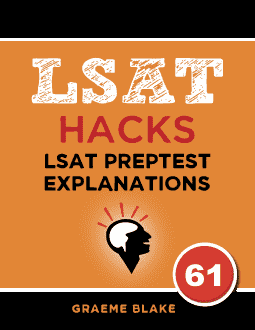QUESTION TEXT: Near many cities, contamination of lakes and…
QUESTION TYPE: Role in Argument
CONCLUSION: Water is one of the main sources of water pollution.
REASONING: Rainwater runoff passes over buildings and pavement. As it does this, the water picks up oil and other pollutants. The runoff eventually brings these pollutants into lakes and river. This rainwater runoff pollution is actually greater than pollution from industrial discharge.
ANALYSIS: The sentence in question is at the start of the argument. The author tells us that rainwater runoff often causes more pollution than industry does.
The sentence is evidence for the conclusion: water (runoff) is a big polluter of water. How does the first sentence support this? It’s because the author expects us to know from outside knowledge that industrial pollution is a major source of water pollution. So if rainway runoff is even bigger, then runoff (water) is indeed also a major source of pollution.
(Note: The argument isn’t clear about whether rainwater has any pollutants before it runs over pavement. But this question has no impact on the argument or the right answer, so you don’t have to think about it in timed conditions.)
___________
- The conclusion is the final sentence: water is a major water pollutant.
- This answer is referring to pollution overall. The stimulus only told us about water pollution. It’s possible industrial pollution affects things other than water, and so is worse overall.
So this answer can’t be right. It’s saying something the argument didn’t say. - The claim that water pollutes more than industrial discharge is a premise. It’s not supported – we’re meant to take it as a fact because the author asserts it. (The LSAT has no space to include detailed results from studies proving premises correct.
- CORRECT. We know from common knowledge that industrial discharge is expected to be a large source of pollution. So saying that water pollutes more than industrial discharge implies that water is indeed a large source of pollution.
(If your reaction was: “but we can’t assume that:
1. You can assume stuff that’s common knowledge. In this case, you know that’s why the author included the fact.
2. This is a role in argument question. You’re evaluating, not criticizing the argument. You can relax the critical instinct to an extent here. - The author actually never said whether industrial discharge pollutes cities. Maybe it doesn’t pollute them much. This argument is talking about lakes and rivers near cities: it isn’t necessarily talking about cities themselves.


Leave a Reply